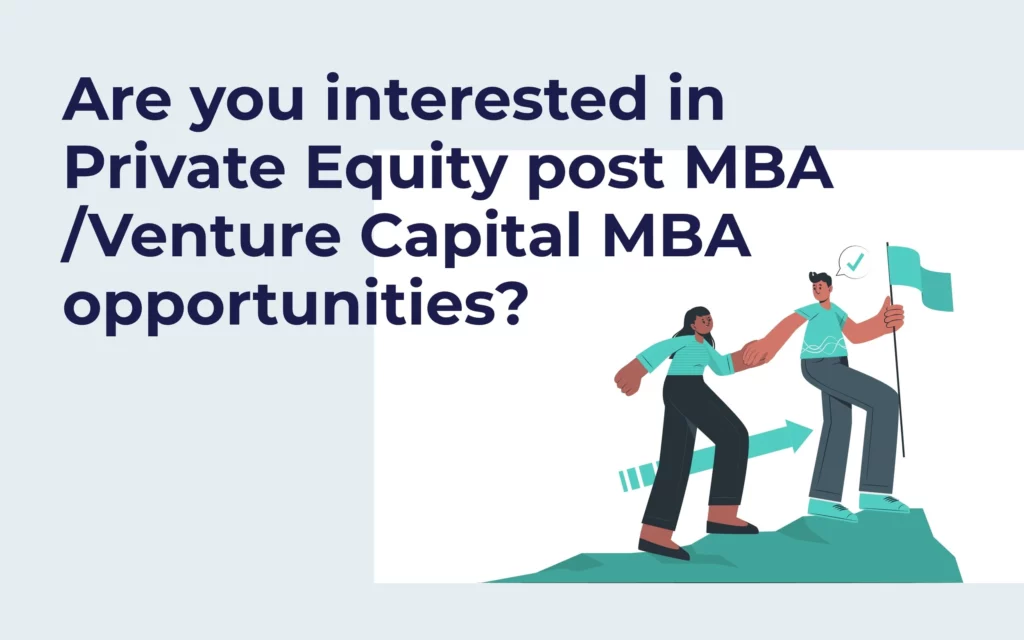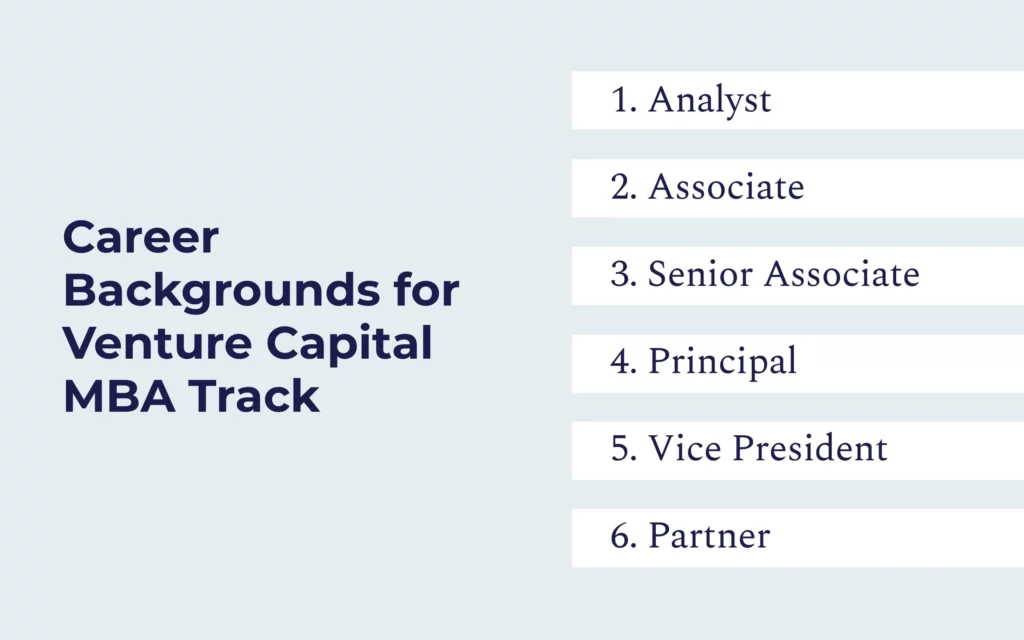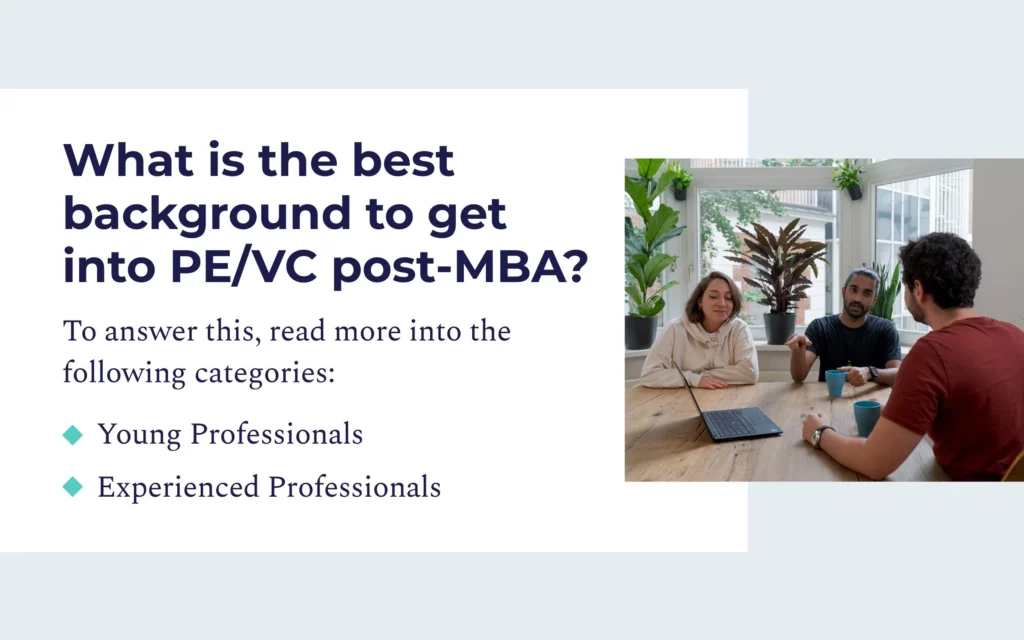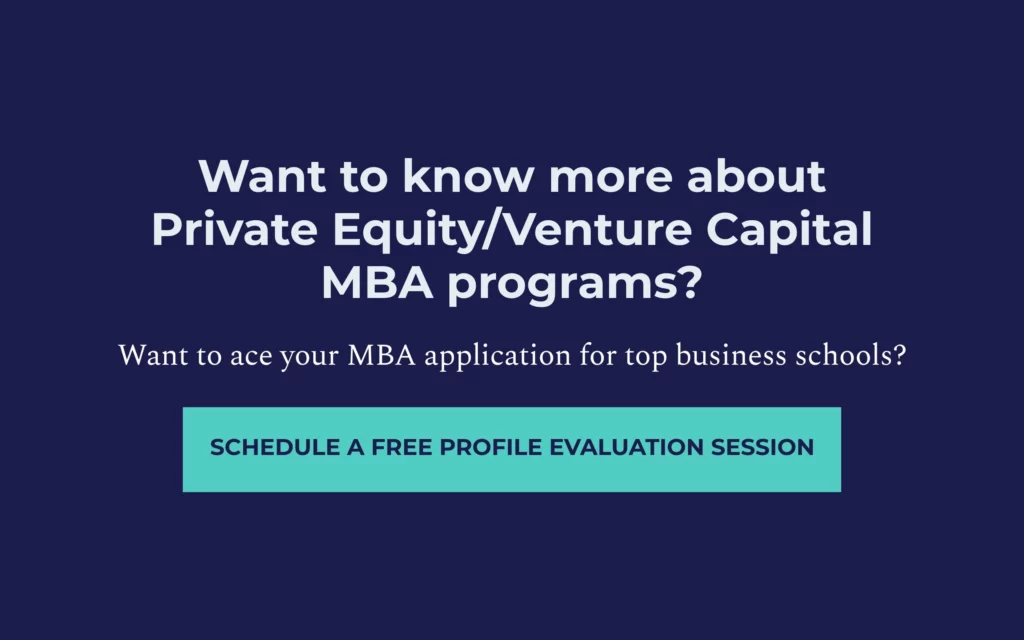Are you interested in Private Equity post MBA/Venture Capital MBA opportunities

Are you aiming to break into Private Equity post MBA or explore opportunities in Venture Capital? These industries are some of the most coveted yet competitive fields for MBA graduates. A career in private equity (PE) offers immense potential for growth, lucrative compensation, and the opportunity to work with high-profile companies. Similarly, venture capital (VC) opens doors to investing in cutting-edge startups and disruptive technologies. But how can an MBA help you break into these industries? In this blog, we’ll delve into the skills you need, how an MBA can enhance your prospects, and the best strategies for securing a role in PE or VC.
Here is the Snapshot of the article:
What Does It Take to Have a Private Equity Post MBA and Venture Capital MBA Track
Numerous applicants are keen on getting a Private Equity after MBA or investment (VC) career after their MBA cohort, yet they don’t have a genuine handle of what that implies. Let’s make it more straightforward for you.
Private Equity post MBA and the Venture Capital MBA opportunities must be considered two sides of the same coin. The venture Capital track could be viewed as a subset of Private Equity. Private Equity after MBA and Venture Capital MBA track are two unique universes. MBAs are teed up for an energizing location in the Private Equity post MBA or Venture Capital MBA track with the correct information and work insight.
The principal motivation behind why the Venture Capital MBA track is so cutthroat is that it’s anything but a ton of direct information. And to get the best out of these jobs, you need to have a grasp of things beforehand because you can’t simply learn everything just in a study hall (especially when you are looking for private equity MBA jobs); you need to know by doing and exploring it to the core.
Do you need an MBA for venture capital or a private equity career? How difficult is the path to land a Private Equity post MBA /Venture Capital MBA track job? This article will discuss the background and factors necessary to ace your admission in private equity MBA/ Venture capital MBA programs. We will also share important facts about business schools offering these programs.
Here’s a fast and general introduction to the Private Equity post MBA or Venture Capital MBA track to give you an essential comprehension of this field.
Private Equity is about monetary designing, and MBA in Finance or any degree in accounting would help.
Firms that focus on the Venture Capital MBA track line, particularly, request that you have an effective enterprising encounter to be a Venture Capital or have a boatload of cash and extraordinary betting abilities.
In both the cases of the Private Equity and Venture Capital track, MBA is discretionary. MBA is advantageous (more when you are keen on landing into private equity after MBA) as you don’t need to demonstrate each day that you are an extrovert and have the preliminary skills. Plus, you have the option to oversee individuals, assets, and financial plans through an MBA. An MBA degree nearly expects that you have all these forces and prepare yourself for the Private equity post MBA and Venture capital MBA track.
Do You Need an MBA Degree to Land a Private Equity Post MBA /Venture Capital MBA Track Job

Depending upon what level you are joining a Private Equity or Venture Capital firm, you might require an MBA.

Venture Capital makes a difference in considering prior and less developed organizations and the stuff to make them effective. For Private Equity, you are utilizing different recipes for progress.
Venture Capital MBA Track: We have collated a list of different professions which may or may not need a Venture Capital MBA. But as a proven fact, irrespective of what background you come from, an MBA is always icing on the cake for post-Venture Capital MBA opportunities. You’ll undoubtedly profit from having an MBA to work in the field of Venture Capital MBA track so you can show your extravagant institute of matriculation.
Need of an MBA for venture capital for these different professionals:
Analyst (No need)
Associate (No Need)
Senior Associate (Probably)
Principal (Probably)
Vice President (Probably)
Partner (Probably)
General Partner (Probably)

Private Equity after MBA: I think Private Equity after MBA makes a massive difference in your career, and you may never be able to grow out of your role and break into PC only basis your work. Being a very tight-knit community, individuals do need a private equity MBA program to break into Private Equity post MBA. Private Equity post-MBA is somewhat more customary in valuation and speculation portfolio methodology than VC.
Need of an MBA for private equity for these different professionals:
Analyst (No need)
Associate (Probably)
Senior Associate (Probably)
Principal/Director (Probably)
Vice President (Probably)
Managing Director (Probably)
There are exceptions for Private Equity opportunities, yet those are the uncommon, exceptional cases. It’s anything but an issue of timing. When Private Equity got hot, around the last years of the 90’s you didn’t have as many MBAs; however, Private Equity after MBA has become a norm over the long run.
Should People Look to Work at Private Equity/Venture Capital Jobs to Pursue These Fields Post MBA
In other words, should you have prior experience in these fields or at least have the core skills required in these fields to have a proven solid career in Private Equity post MBA or the Venture Capital MBA track?
If you wish to have any kind of long-haul profession in Private Equity post MBA (and if you don’t have insight in the field of running a fruitful organization), then the appropriate response is, in all likelihood, yes.
In the vast majority of the more prominent respectable Private Equity firms, there are two tracks – a pre-MBA track and a Private Equity post MBA track:
1) Pre-MBA partners are prominent young individuals who are emerging from two-year venture banking examiner programs. They are typically employed to work for a few years with the arrangement. If they are great at what they do, they won’t be advanced any higher inside the firm and are instead advised to seek an MBA for Private Equity post MBA opportunities.
If you are happy with a slow career progression in the industry, you won’t require an MBA to break into the Private Equity field. Be that as it may, it will likewise be hard for you to have a genuine profession in Private Equity, as most of the pre-MBA partners are not advanced
2) Private Equity post MBA partners do have some slim chances on the promotable track. If you have no earlier PE experience or just pre-MBA partner insight, you will undoubtedly begin Private Equity your profession at this level. But truth be told, you may not achieve the kind of growth (observed in Private Equity post MBA applicants having prior experience) you aspire to in the industry without a good private equity MBA program and prior work experience. (And when we say good private equity MBA program, we do not mean in terms of prestige but a private equity MBA program which can help you get hands-on experience and networking opportunities to break into the field)
A few Private Equity firms advance some exceptional pre-MBA partners. A few (by and large, more modest) firms will employ people with non-customary foundations into the promotable track. Generally, work experience before MBA is firmly prescribed if you need professional training and achieve Private Equity MBA jobs.
Want to pursue an MBA but not sure if your profile fits?
Talk to our Profile Experts to know your chances for a top MBA Program.
GET A FREE PROFILE ANALYSISWhat Is the Best Background to Get into a Venture Capital MBA Path or Private Equity Post MBA

The decent thing about the Venture Capital MBA path and Private Equity after MBA is that they’re so vast! You can indeed go into these fields from any industry as long as you accomplish great work. Let’s make it simple by fragmenting it into two parts- by considering young versus experienced professionals.
Young Professionals
Young professionals are people who have recently graduated from college and got into the buy-side. Typically, most young professionals come from Investment Banking backgrounds.
Why? Because at the bottom of the buy-side firm sits a team of people that feeds the managing partners all the presentations and analysis they need to make decisions.
Why can’t young consultants often switch over to the Venture Capital MBA path and Private Equity MBA jobs?
As an analyst/associate, you’re not there to “guide the portfolio company” of either Venture Capital MBA or Private Equity MBA jobs. You’re simply too young and inexperienced, so that’s what the partners do. Consultants also work hard and have unique skill sets.
However, management consulting firms train consultants more so on presentation skills than analytics. Therefore, in an industry where the bottom of the totem pole doesn’t need a massive emphasis on analytics, they are much less valuable. We’ll get back to why they can be great hires later on in their careers.
Now, if a young professional decides to join a Venture Capital MBA fund or Private Equity after an MBA fund, how do they climb up the ranks? Well, it’s not as easy as simply sticking around. Most funds don’t have a partner track and instead tend to hire from outside. As a result, young professionals must quit or somehow learn to enter one of the industries I list below and gain substantial experience before going into the Private equity post MBA or Venture capital MBA track.
Experienced Professionals
Now, after a couple of years working in the related fields, you may have become very knowledgeable in a particular area. It can be tricky because there are many ways to get into the Venture Capital MBA path and Private Equity MBA jobs later in your career. Let’s simplify and categorize the typical candidates:
The Golfer that Talks Real Smooth

Let’s start with The Entrepreneur. This is the person who has launched and sold multiple companies. She has experience in exactly what startups are trying to do and has the success stories to back it up. She might not do everything the MBA way, but she gets it done, and it works. A great asset to any Venture Capital fund, she will help mentor startups to become massive hits! So, an experienced entrepreneur is making her way into Private equity post MBA or venture capital MBA track or related fields.
The Industry Maverick is experienced at operating companies. She has experience in a specific field and has transformed a company to produce great successes. She has the industry know-how to know what to do and the industry connections to make things happen. She can guide multiple companies or take an active role and be inserted into a portfolio company as CEO to run the whole show. She can provide a vast amount of value and can be a huge potential source for private equity post MBA/Venture capital MBA.
The Best Practices Guru is an experienced consultant who has a solid resume that makes everyone drool. She’s helped every Fortune 500 company out there and knows them inside and out. Do you want to transfer your manufacturing offshore? She’s allowed companies to do that over a dozen times! She is the person who knows how everyone else operates and can help you copy the proven models. She can support multiple companies or take an active role leading a portfolio company as CEO. She is primarily helpful for growth equity PE and buyout PE funds. So, if you identify yourself as one of these people, you sure are making way to break into private equity after MBA or getting yourself into the Venture capital MBA track.
The Warlord of Finance knows how to make the numbers work. She can engineer a failing company to become a cash cow or create a term sheet to earn her money even if the company fails. Her years of experience in finance give an inside track to all the best ways to extract value. She’s harsh and not afraid of pushing your company until it succeeds (or fails). She can become your best friend as she finds ways to make money that you never even thought of or your worst enemy as she slides industry jargon to you and makes you sign it—a crucial part of any buy-side firm, especially in private Equity MBA jobs.
Finally, we have The Golfer that Talks Smooth. Now don’t take her lightly because she may be the most powerful person in the entire firm. She has connections to people/places/things you’ve never even heard of, and she can find money in any crevice of the earth. Throw her into the Marianas Trench, and she will return to you with the riches of the sea, straight from Jupiter’s own hands. Now, although not all buy-side firms need a Golfer, most do. Although the Tier 1 funds have a track record that makes LPs fight hand over fist to get into their new fund, they still often have a Golfer. Why? Because if LPs are fighting for you, maybe you can raise your management fee and percent carry. Now you need your Golfer to start convincing people why your ridiculous prices are worth paying for. So, if you are a golfer, you will make a niche of your own in private equity MBA jobs or career in venture capital MBA.
Factors That Will Help You Decide Which Schools Are Best in Private Equity MBA Programs /Venture Capital MBA Programs for You
WHICH MBA IS BEST FOR PRIVATE EQUITY OR VENTURE CAPITAL?
The most crucial factor in whether an MBA program is likely to lead you to a career in private equity after MBA or venture capital MBA career track is if the program is at a “top, top tier school”- reputation matters! (especially for the tight-knit industries).

Networking opportunities are crucial. The key hallmark of an MBA program that provides solid preparation for private equity MBA jobs and venture capital MBA companies is that the partners of these companies serve as speakers and speak at the school events. Another positive sign is when the school promotes the critical relationship of students in internships or job placements in venture capital MBA programs or private equity MBA programs. Harvard Business School’s online education portal stated that the critical factor in determining whether a school is closely related to private equity post MBA opportunities and venture capital MBA careers is to look at the employment rate in these two areas. MBA students should connect with alumni of the target school who work in venture capital or private equity after MBA. Get to know if the school helps them find opportunities post venture capital MBA program or into good private equity MBA jobs. There are campus interviews for such employment and school preparation courses to make suitable for the roles into private equity post MBA and VC jobs.
It is valuable to go to a school with experience in a field where you lack experience. The future MBA students with extensive financial experience should look for a school where they can learn other essential skills required in the venture capital MBA field and private equity post MBA, such as entrepreneurship. On the contrary, future MBAs with extensive experience in specific industries such as fashion should seek MBA courses that develop their financial skills to help them break into private equity MBA jobs and VC jobs. Experts recommend that venture capital MBA aspirants and private equity MBA aspirants choose an MBA major and supplement their previous work experience by teaching them a new skill.
Find courses on how to expand your business successfully. Learning how to grow a business is essential. You must focus on the avenues of growth and expansion in venture capital. Although many media outlets continue to focus on “starting” new businesses, the real value is created when they are actually “developed.” So, a school should be shortlisted for a Private equity MBA program (and Venture capital MBA) based on its curriculum focus areas and skills it can instill in its PE/VC students.
Which Business Schools Are Best for a Career in Private Equity MBA Jobs and Venture Capital MBA Career and Why

1) BOOTH
BOOTH focuses on the Private equity post MBA and Venture capital MBA track. BOOTH has two student clubs holding lectures and mock interviews.
The Polsky Entrepreneurship Center provides students with exchange opportunities in the said fields.
2) Columbia Business School (CBS)
The Columbia Business School of Columbia University in New York City has close ties with the PE/VC industry. The school’s private equity MBA program is a favorite of students who wish to enter Private Equity after MBA.
3) The Chinese University of Hong Kong (CUHK)
The Chinese University of Hong Kong Business School can choose sports electives from the funding flow of the MBA program. According to Find MBA data, 13% of its classes in 2014 were hired by private equity post MBA or firms that provide venture capital MBA opportunities. However, in 2017, it dropped to around 6%.
4) Harvard Business School
Harvard Business School In 2017, about 18% of students at Harvard Business School in Harvard, Massachusetts, entered the sports or venture capital MBA industry. Many Harvard Business School graduates have obtained important positions in well-known investment management companies.
5) INSEAD
INSEAD’s European campus in Fontainebleau, France, is an ideal networking hub for Private Equity post MBA and has provided talents for many Private Equity MBA programs graduates for firms in the UK.
You can see an extensive analysis of Insead’s employment report here.
6) Kellogg
The Kellogg School of Management offers elective courses related to finance and venture capital MBA programs. The Heizer Centre for Private Equity and Venture Capital Center is Kellogg’s research base in this field.
7) LBS
London is the world center for students interested in Private Equity post MBA. Given its geographical location, there may not be a school with an advantage over the London Business School. Major Private Equity and Venture Capital firms are located near LBS.
8) Stanford University School of Business
Stanford University sends approximately 15% of its students to Private Equity MBA jobs, venture capital MBA opportunities, or leveraged buyouts. GSB has elective courses that specialize in this field.
9) Wharton School of Business
Wharton sends approximately 9% of its graduates to private equity MBA jobs, venture capital MBA opportunities, and leveraged buyouts, and their post MBA VC salaries are usually high. In 2017, Stanford, Harvard, and Wharton Business School sent the most significant number of students to Private Equity post MBA and venture capital firms: 16%, 18%, and 14% of the class, respectively. In the same year, Booth sent approximately 7%, Kellogg 4%, and Colombia 6% to these departments.
Applicants question us: Do Private Equity post MBA firms and Venture Capital companies hire people because they graduated from top business schools? Or do the best schools choose candidates because they have previously connected with Private Equity MBA program candidates / Venture Capital companies and are most likely to be hired by these companies after graduation?
It can be a little chicken and a little egg. Business school graduates from leading Private Equity post MBA and venture capital MBA programs are certainly a good indicator of the quality of MBA programs with vital academic records in finance and accounts-related streams.
As you can see, there are lots of ways to join or start your own VC fund.
But, you need to be a massive success in whatever you choose to do. Easier said than done, eh? 🙂

You have to make yourself more eligible as a potential recruit and need to improve your strategies. You need to educate yourself and get advice from experts in the field.
Study how deals are done in the Private Equity post-MBA and Venture Capital MBA fields to know what you are discussing and being questioned about during an interview. It will help if you get yourself involved beyond the classroom. Try to network and get yourself an internship in a Private Equity or Venture Capital firm.
Talk to people in those industries, review Venture Capital /Private Equity post-MBA cases/deals, affiliate with the appropriate student clubs, and immerse yourself in every way possible. Hop on a 1:1 call with us.
Frequently Asked Questions
1.
How does Venture Capital (VC) differ from Private Equity
A: While both PE and VC involve investing in companies, VC focuses on early-stage startups with high growth potential, providing capital in exchange for equity. In contrast, PE typically invests in more mature companies with the goal of optimizing their operations and profitability.
2.
Is prior experience in finance or investment necessary for pursuing PE or VC post-MBA
A: While prior experience in investment banking, consulting, or corporate finance is helpful, it is not always mandatory. Many MBA programs offer pathways to build these skills through internships, PE/VC clubs, and case competitions.




Leave a Reply